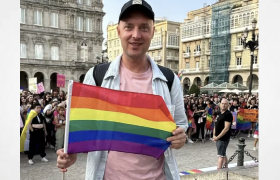SBS New Australia
For 14 years, Vladimir Kosarevskiy, then not an openly gay man, worked at Moscow’s most innovative library. When the government ordered him to destroy books referring to same-sex relations, he rebelled.
Vladimir Kosarevskiy loved his job.
As the director of Moscow’s Anna Akhmatova library, he oversaw its transformation into a ‘smart library’, the first of its kind in the Russian capital. The 2,500-square-metre space included a coworking area, cinema, and even a recording studio. With its state-of-the-art facilities and a diverse array of cultural and arts events, the library became a popular community centre for locals and a source of pride for city officials.
But as the Russian government expanded its crackdown on gay and transgender rights, Kosarevskiy, 40, found it difficult to reconcile his identity as a gay man with public service. The breaking point came when Russian authorities gave him orders to destroy dozens of books, including those deemed ‘propaganda of non-traditional relations’.
…/..
“At work, for instance, your colleagues might tell personal stories about their families and partners. But you can’t do it. It’s not acceptable,” he told SBS Russian. “You get used to this self-imposed censorship as if that part of your life doesn’t exist.”
In 2013, the Russian parliament passed a bill criminalising what it called ‘propaganda of non-traditional sexual relations’ to minors. According to Kosarevskiy, the impact of the law wasn’t immediate. Rather, it would take some time to catch up with him and the broader Russian society.
By 2015, Kosarevskiy started to realise it was time to choose between his career and his LGBTIQ+ community. The library where he worked had a children’s section, which made Kosarevsky worry about putting himself at risk under the new law. He eventually decided to distance himself from the LGBT Sports Federation to avoid any controversy.
Book purge amid the war
Kosarevskiy’s job became increasingly challenging after Russia invaded Ukraine in February 2022.
Public service employees like him were obligated to attend state-organised concerts and rallies aimed at boosting public support for the war. Being in a leadership position, Kosarevskiy was responsible for ensuring his team’s attendance but he felt ashamed to participate in propaganda events for the war he opposed.
Read More




